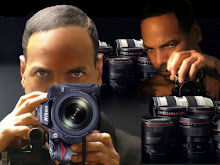

The youngest of nine children, Dizzy's father was a pianist and band leader .
Dizzy's father kept all the instruments from his band in the family home and so
the future trumpet great was around trumpets, saxophones, guitars and his
father's large upright piano most of his young life. Dizzy's father died when he
was ten and never heard his youngest son play trumpet, although he did get the
chance to hear him playing around on the piano at a very early age.
In 1933, after graduating from a secondary school, Gillespie received a music scholarship to attend Laurinburg Institute, in North Carolina. He stayed there for two years, studying harmony and theory until his family moved to Philadelphia, Pennsylvania, in 1935. In Philadelphia, Gillespie began playing trumpet with local bands, learning Roy Eldridge's solos from records and radio broadcasts: it was in Philadelphia that he picked up his nickname of "Dizzy.". In 1937, "Dizzy" moved to New York and replaced Eldridge in Teddy Hill's Orchestra. After a couple of years Gillespie moved on to Cab Calloway's band in 1939.
In 1937, Gillespie met his future wife, Lorraine, a chorus dancer at the famed Apollo Theater: they were married in 1940 and remained together until his death. Gillespie worked with many bands during the early 1940's (Chick Webb, Fletcher Henderson, Benny Carter, "Fatha" Hines and Billy Eckstine's seminal band ) before teaming up with Charlie Parker in 1945. Their revolutionary band ushered in the bebop era and was one of the greatest small bands of the 20th century. An arranger and composer, Gillespie wrote some of the greatest jazz tunes of his era: songs such as "Groovin' High", "A Night in Tunisia" and "Manteca" are considered jazz classics today..
With his trumpet and its upturned, golden bell, goatee, black horn rim glasses and beret, Gillespie became a symbol of both jazz and a rebellious, independent spirit during the 1940's and 50's. His interest in Cuban and African music helped to introduce those music's to a mainstream American audience. When he died he was famous and beloved everywhere and had influenced entire generations of trumpet players all over the world who loved and emulated his playing and his always positive, upbeat, optimistic attitude.





